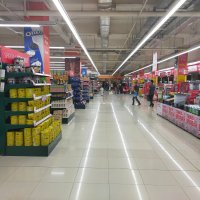The future of Belgian food retail in 2025: key trends, challenges and opportunities
The future of Belgian food retail in 2025
Belgium’s food retail sector is rapidly evolving, influenced by:
- shifting consumer preferences
- the rise of digital shopping
- an increasing demand for sustainability.
Retailers face the challenge of adapting to these changes while seizing the opportunities they present.
Let’s explore together the key trends shaping the future of food retail in Belgium and how retailers can respond as we move toward 2025.
Four key trends
1. Sustainability: from optional to essential
Sustainability has transitioned from a competitive edge to a business necessity. Globally, 95% of consumers are trying to live more sustainably and expect the same from the brands they choose (according to NielsenIQ). Belgian retailers are responding by reducing waste, sourcing locally, and minimizing their carbon footprint.
For example, Colruyt Group has embraced innovative farming methods like vertical farming, which uses less land and water while providing fresh produce year-round. This aligns with the growing consumer demand for locally produced and sustainably sourced food.
However, there’s still room for improvement. Consumers often find it challenging to locate eco-friendly products, especially when shopping online. Retailers must ensure that sustainability information is easy to find and understand, both online and in-store. By integrating green initiatives into the shopping experience, retailers can strengthen customer loyalty.
2. The digital revolution: online grocery shopping is here to stay
The COVID-19 pandemic has accelerated the shift to online grocery shopping. By 2025, the Belgian online grocery market is expected to reach €2.5 billion, up from €1.6 billion in 2023 (according to PwC).
To meet this growing demand, retailers are investing in their digital infrastructure to enhance the shopping experience. This includes:
- User-friendly e-commerce platforms that provide a seamless online shopping experience.
- Omnichannel systems that allow customers to transition easily between online and in-store shopping.
- AI-driven personalization tools that offer tailored promotions and product recommendations based on individual shopper preferences.
Additionally, logistics must become more efficient. Technologies like automated warehouses, smart carts, and AI-powered order management are crucial for managing home deliveries and click-and-collect services efficiently. The key is to balance convenience and efficiency while ensuring that digital platforms meet the expectations of today’s consumers, who seek fast, tailored, and frictionless shopping.
3. Price wars and promotions: competing on affordability
Belgian consumers are highly price-sensitive, shaping the strategies of major retailers. Supermarkets like Aldi and Lidl dominate the low-cost segment, prompting traditional retailers such as Colruyt, Delhaize, Albert Heijn, and Jumbo to ramp up promotional offers.
Promotions drive consumer traffic, with Colruyt’s Top Promo’s and 1+1 offers at Albert Heijn, Lidl, and Delhaize enticing budget-conscious shoppers. These promotions not only increase foot traffic but also boost short-term sales.
However, NielsenIQ indicates that the growth rate of promotional sales is slowing. While promotions remain necessary, they must evolve into longer-term strategies beyond quick wins. Retailers need to strike a balance between attracting customers with competitive pricing and maintaining profitability.
In a highly competitive market, the ability to offer personalized promotions through digital channels, particularly via apps like Xtra (Colruyt’s loyalty app), is becoming more important.
4. Convenience and proximity shopping: the growing demand for hyperlocal stores
The trend toward convenience shopping is becoming more pronounced as Belgian consumers shift to frequent, smaller trips instead of large weekly shops. Retailers are responding by expanding their proximity store formats and offering ready-to-eat meals.
Okay and ready-to-eat meals
Okay, part of Colruyt Group, successfully combines fresh groceries with ready-to-eat meal solutions. Their Easy Friday campaign promotes easy-to-prepare meals for busy customers seeking quick solutions. This reflects the increasing demand for convenient meal options that don’t compromise on quality.
Other chains, such as Carrefour Express and Proxy Delhaize, are opening smaller stores in urban areas to offer more local shopping options. These stores focus on fresh, local products and provide a convenient alternative for time-poor consumers who need to grab groceries on the go.
As we move toward 2025, the demand for hyperlocal formats and convenience will continue to grow, particularly in urban centers where proximity and ease of access are crucial.
Opportunities and challenges for the future
Opportunities
Personalization through data analytics and AI
As consumer preferences become more fragmented, retailers can leverage data analytics and AI to offer hyper-personalized shopping experiences. Using customer data from online and in-store purchases, retailers can tailor promotions, recommend products, and provide relevant content to each shopper. By tapping into this technology, retailers can drive loyalty and increase basket size by offering the right products at the right time.
Digital transformation and e-commerce enhancement
The online grocery market in Belgium is projected to reach €2.5 billion by 2025, presenting a significant opportunity for growth. In this context, it is essential to enhance the user experience on e-commerce platforms and facilitate seamless transitions between channels. Focus on designing user-friendly online shopping interfaces, implementing AI-driven personalization tools for tailored promotions, and developing omnichannel marketing strategies that bridge online and offline shopping experiences. By adopting this approach, businesses can meet the evolving needs of consumers and strengthen their competitive position.
Expansion of private labels
Private label products are evolving from low-cost alternatives to premium offerings that compete with national brands. Retailers can expand their private label portfolios to include sustainable, health-conscious, and gourmet products, allowing better control over quality and pricing while meeting consumer demand for affordable, high-quality options.
Convenience and proximity marketing
There is a growing demand for hyperlocal stores and convenience shopping, presenting an exciting opportunity for businesses. To capitalize on this trend, it’s crucial to promote proximity store formats and ready-to-eat meal solutions. Utilize local SEO techniques to enhance visibility, optimize your website with local keywords like “fresh produce in [city]” or “quick meals nearby.” Create marketing campaigns that emphasize the benefits of frequent, smaller shopping trips and how urban stores offer fresh, local products and quick meal options. By highlighting these advantages and leveraging local SEO, businesses can attract customers and improve their shopping experience.
Challenges
Rising costs of e-commerce and logistics
While e-commerce is a growth driver, it also brings higher logistics costs, particularly for last-mile delivery. Retailers must optimize their supply chains to meet growing demand while maintaining profitability. Balancing the costs of last-mile delivery with consumer expectations for faster, cheaper deliveries is a significant challenge. Investing in automation and sustainable transportation methods will be necessary to keep costs down and enhance delivery efficiency.
Navigating price sensitivity
Belgian consumers exhibit a high degree of price sensitivity, making it increasingly challenging for businesses to rely on traditional promotions, which are becoming less effective. This creates a pressing need to attract customers without significantly impacting profitability. Focus on developing value-driven marketing strategies that emphasize quality and convenience in addition to competitive pricing. By utilizing personalized promotions, we aim to enhance the perceived value of products and services, ensuring that businesses can successfully engage price-sensitive consumers while maintaining healthy profit margins.
Adapting to changing regulatory landscapes
Stricter regulations around sustainability, packaging waste, and food safety are emerging across Europe, including Belgium. Retailers must navigate these regulations, particularly regarding plastic reduction, carbon emissions, and food traceability. Staying ahead of regulatory changes can be costly, but non-compliance could lead to fines or reputational damage.
Standing Out in a Competitive Digital Space
In today’s retail landscape, as more retailers enhance their digital presence, differentiation becomes increasingly challenging. To capture consumer attention, businesses must embrace innovative digital marketing strategies. This calls for a focus on emerging trends like interactive content, virtual reality experiences, and social commerce. Additionally, leveraging unique brand stories and effective customer engagement tactics can help brands stand out in a crowded marketplace. By prioritizing these approaches, retailers can create memorable experiences that resonate with consumers and foster lasting connections.
Conclusion
Belgium’s food retail landscape in 2025 will be shaped by sustainability, digital innovation, and price competition. Retailers that quickly adapt to these trends, offering seamless digital experiences, balancing pricing strategies with profitability, and embracing sustainability, will secure a competitive edge.
The race for consumer loyalty is no longer just about offering the lowest price or the most convenient store. Success will come to retailers who effectively integrate sustainable practices, digital solutions, and personalized shopping experiences, creating a seamless and rewarding customer journey.
More marketing news and insights
Want more marketing news and insights? Subscribe to the marketing newsletter and stay up-to-date about the latest marketing news.
Marketing newsletter
- Latest marketing trends, blogs, events, ...
- Monthly updated
- Directly in your inbox



